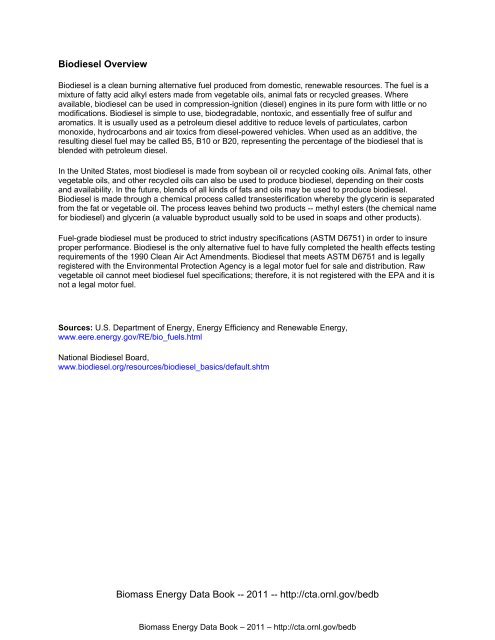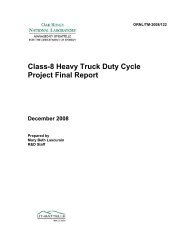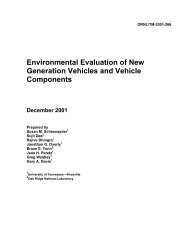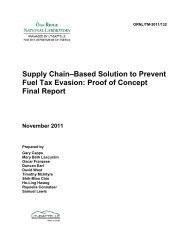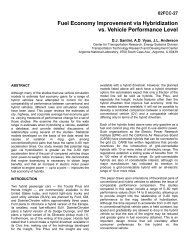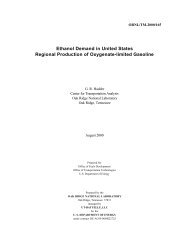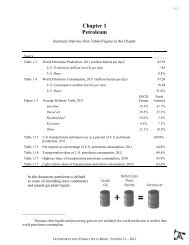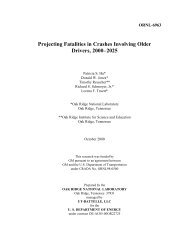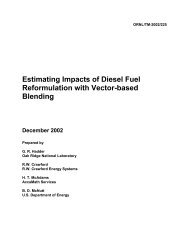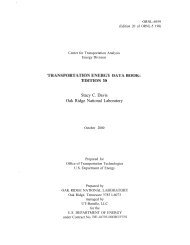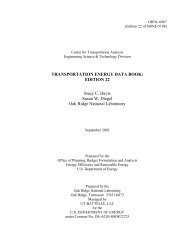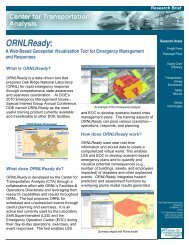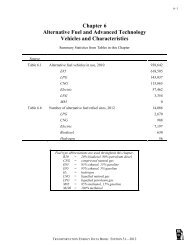Biomass Energy Data Book: Edition 4 - Full Document - Center for ...
Biomass Energy Data Book: Edition 4 - Full Document - Center for ...
Biomass Energy Data Book: Edition 4 - Full Document - Center for ...
Create successful ePaper yourself
Turn your PDF publications into a flip-book with our unique Google optimized e-Paper software.
Biodiesel Overview<br />
Biodiesel is a clean burning alternative fuel produced from domestic, renewable resources. The fuel is a<br />
mixture of fatty acid alkyl esters made from vegetable oils, animal fats or recycled greases. Where<br />
available, biodiesel can be used in compression-ignition (diesel) engines in its pure <strong>for</strong>m with little or no<br />
modifications. Biodiesel is simple to use, biodegradable, nontoxic, and essentially free of sulfur and<br />
aromatics. It is usually used as a petroleum diesel additive to reduce levels of particulates, carbon<br />
monoxide, hydrocarbons and air toxics from diesel-powered vehicles. When used as an additive, the<br />
resulting diesel fuel may be called B5, B10 or B20, representing the percentage of the biodiesel that is<br />
blended with petroleum diesel.<br />
In the United States, most biodiesel is made from soybean oil or recycled cooking oils. Animal fats, other<br />
vegetable oils, and other recycled oils can also be used to produce biodiesel, depending on their costs<br />
and availability. In the future, blends of all kinds of fats and oils may be used to produce biodiesel.<br />
Biodiesel is made through a chemical process called transesterification whereby the glycerin is separated<br />
from the fat or vegetable oil. The process leaves behind two products -- methyl esters (the chemical name<br />
<strong>for</strong> biodiesel) and glycerin (a valuable byproduct usually sold to be used in soaps and other products).<br />
Fuel-grade biodiesel must be produced to strict industry specifications (ASTM D6751) in order to insure<br />
proper per<strong>for</strong>mance. Biodiesel is the only alternative fuel to have fully completed the health effects testing<br />
requirements of the 1990 Clean Air Act Amendments. Biodiesel that meets ASTM D6751 and is legally<br />
registered with the Environmental Protection Agency is a legal motor fuel <strong>for</strong> sale and distribution. Raw<br />
vegetable oil cannot meet biodiesel fuel specifications; there<strong>for</strong>e, it is not registered with the EPA and it is<br />
not a legal motor fuel.<br />
Sources: U.S. Department of <strong>Energy</strong>, <strong>Energy</strong> Efficiency and Renewable <strong>Energy</strong>,<br />
www.eere.energy.gov/RE/bio_fuels.html<br />
National Biodiesel Board,<br />
www.biodiesel.org/resources/biodiesel_basics/default.shtm<br />
<strong>Biomass</strong> <strong>Energy</strong> <strong>Data</strong> <strong>Book</strong> -- 2011 -- http://cta.ornl.gov/bedb<br />
<strong>Biomass</strong> <strong>Energy</strong> <strong>Data</strong> <strong>Book</strong> – 2011 – http://cta.ornl.gov/bedb


